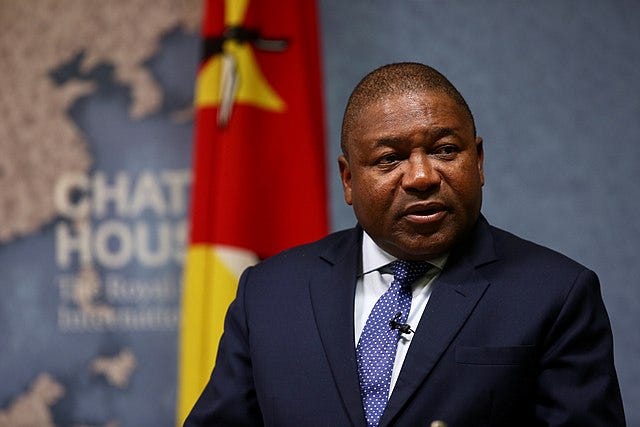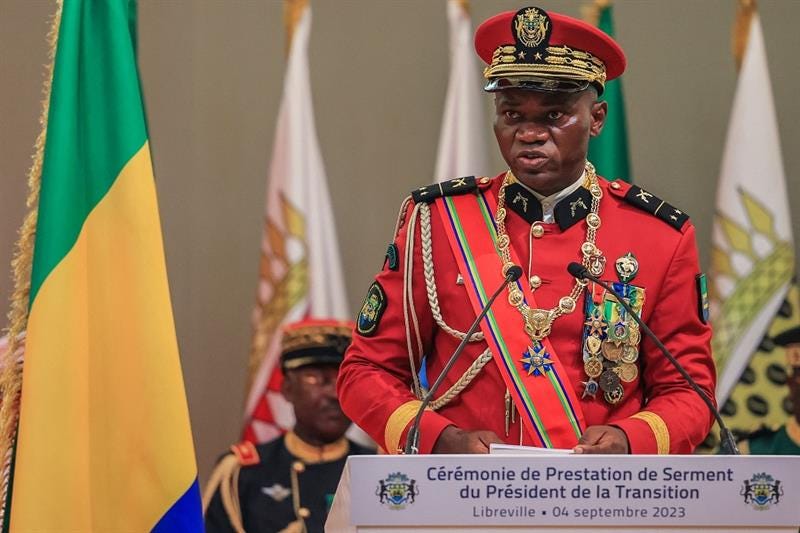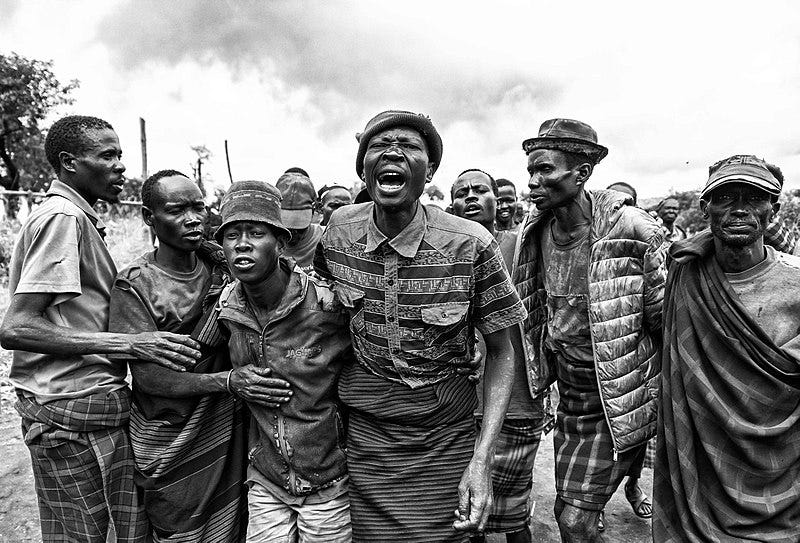🔅 Welcome to the New Gabon, Mozambique's President Dodges International Lawsuit
Plus, Notable Absences From Mnangagwa's Swearing In & The Ik People's Innovative Solution to Poor Network Connectivity
Photo of the day
The Great Bioko mountain, Equatorial Guinea
Markets:
🟢 Nigerian SE: 68,334.68 (+0.08%)
🔴 Johannesburg SE: 75,375.22 (-0.51%)
🟢 Ghana SE: 3,052.08 (+0.05%)
🔴 Nairobi SE: 98.01 (-0.09%)
🔴 US S&P 500: 4,507.67 (-0.18%)
🔴 Shanghai Composite: 3,154.37 (-0.71%)
Zambia, Uganda and Kenya's Numbers | Zambia’s inflation rate is skyrocketing—it’s hit 10.8%, the highest it’s been in 16 months. But Uganda’s inflation rate is the lowest it’s been since February last year at 3.5%. Kenya’s rate has also dropped to a 16-month low of 6.7%.
*Data accurate as of the close of markets across the continent
Brief & Bright: Africa's Top Five
Southern African Leaders Keep Their Distance as Mnangagwa Gets Sworn In
The big day finally arrived for Emmerson Mnangagwa—the 80-year-old president of Zimbabwe was sworn in for a second term. But as the festivities got underway, it was clear that something was off: Many of the Southern African Development Community (SADC) leaders, who usually show up for these occasions, were nowhere to be seen. The reason? This election was marred by irregularities and, for once, SADC observers called out the Zimbabwean government for falling short of democratic standards. The absence of one leader, in particular, was noteworthy: Hakainde Hichilema, president of Zambia and current chair of SADC’s organ on defence and security. Hichilema was the one who appointed the body’s observers for Zimbabwe’s vote, and has been attacked by Mnangagwa’s inner circle for alleged bias towards the opposition. Interestingly, the Zimbabwean government invited Zambia’s former president Edgar Lungu, who presided over Hichilema’s imprisonment as opposition leader before losing power in the 2021 elections.
Head of State Immunity: Mozambique's President Can't Be Sued in London
What’s the secret to getting out of a lawsuit? It turns out that being the president of a country helps. Mozambique’s president, Filipe Nyusi, was recently ruled to be immune from a lawsuit brought against him in the High Court in London. This lawsuit is related to a “tuna bonds” scandal involving a colossal $2 billion loan that was concealed from the public. The loan was meant to fund projects like a state tuna fishery. The defendants are accused of serious irregularities but deny any wrongdoing. It’s been almost a decade since the scandal first broke, and this ruling is just the latest in a series of developments in the case. Nyusi’s lawyers argued that he should be exempt from the lawsuit due to his status as head of state. The judge agreed, ruling that Nyusi was indeed immune from the court’s jurisdiction. Guess that’s one way to get out of a sticky situation.
Welcome to the New Gabon
Say goodbye to the Bongo Dynasty, Gabon—there’s a new president in town! Brice Oligui Nguema, who led a coup last week that toppled Gabon’s 55-year-old ruling family, has officially taken the oath of office and promised “free, transparent and credible elections” to restore civilian rule. He’s also promised amnesty for political prisoners and said the coup saved the country from bloodshed after elections that were “obviously loaded.” The influx of the new leader has been met with celebration in the streets of Libreville and Port-Gentil (Gabon's second-largest city), and Oligui has promised to tackle corruption and change Gabon’s dysfunctional pension system. So far, the coup has been met with criticism from some international organizations, but Oligui stands firm in his decision, quoting the anti-apartheid hero Desmond Tutu: “If you are neutral in situations of injustice, you have chosen the side of the oppressor.” Welcome to the new Gabon...
Africa's Climate Crisis: The Heat is On

It’s getting hot in here—in Africa, that is. According to a new joint UN-African Union report, the continent is heating up at a faster rate than the rest of the planet, and this is having devastating effects. Last year alone, there were 80 extreme weather and climate hazards—think droughts, wildfires, and the worst drought in 40 years in the Horn of Africa—which resulted in 5,000 deaths and over $8.5 billion in economic damage. And with Africa producing only a quarter of the global average of carbon dioxide emissions, this situation isn’t going to get any better any time soon. As if that wasn’t bad enough, the report also noted that agricultural productivity has been declining since 1961, meaning that Africa is going to have to import more and more food to make up for the deficit. Competition for natural resources is only going to get more fierce, and if something isn’t done soon, we could see an increase in communal violence. Africa's average temperature increased by 0.3 degrees Celsius per decade in the 1991-2022 period compared to the global average of 0.2 degrees—and it’s only going to keep getting hotter. Leaders have been meeting in Nairobi these past couple of days at the Africa Climate Summit to discuss a way forward.
The Ik People's Innovative Solution to Poor Network Connectivity
Who needs cell towers when you’ve got tall trees? That’s the question on the minds of the Ik people in Kaabong district, Uganda, who have found an ingenious way to stay connected—by using trees to trap mobile phone signals. While there are telecommunication companies operating in the region, phone connectivity remains a formidable obstacle, and the Ik people are stuck relying on specific trees with network coverage. To protect their phones from the weather, they place them in plastic bottles so that they can remain connected. The lack of mobile connectivity has also had a negative impact on business, with traders losing out on gold trade opportunities due to weak network connections and the inability to communicate. The Ik people are calling on telecommunication companies to install network towers and boosters in their area——a tall order, you might say.
Food for Thought
“No matter how tall your grandfather was, you have to do your own growing.”
— Kenyan Proverb.
Are we hitting the mark?
Enjoying Baobab's updates? Spread the joy and share us with friends and colleagues — we'd be thrilled to have them join!
Feedback or thoughts? Just hit reply. We're all ears!








